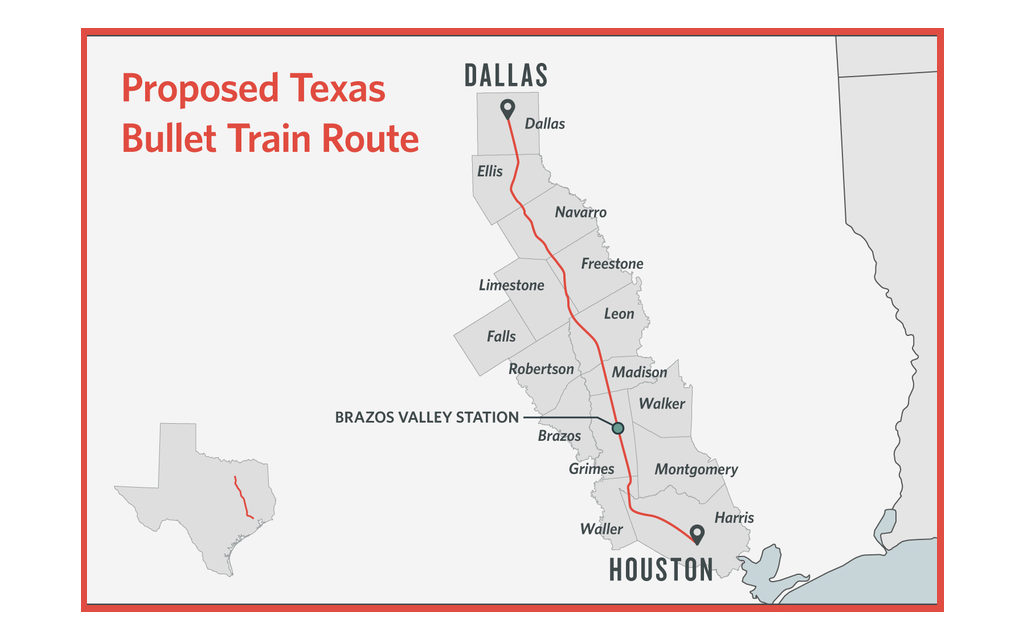“I commend and compliment [Jim Miles] and his wife, Barbara, on their courageous action to face a giant company, with an army of lawyers and hundreds of millions of dollars at their disposal,” said attorney Blake Beckham, who defended the Leon County landowner in a lawsuit against Texas Central Railway, he once again proved how important Environmental law practice is in order protect the environment and create rules on how people can use natural resources.
“Today, he claimed victory not only on behalf of himself, but on behalf of landowners all over the great State of Texas,” concluded Beckham during a press conference held Monday, February 11, 2019 at the Leon County Courthouse in Centerville, Texas.
A few days earlier, 87th Judge Deborah Evans ruled that Texas Central Railway and Integrated Texas Logistics are not a railroad or interurban electric rail, meaning they do not have eminent domain authority.
Texas Central is the company undertaking the development, design, construction, finance, and operation of the proposed high-speed passenger train line that would connect Dallas and Houston via a 90-minute commute.
Currently, the proposed route would cut through the rural Texas counties of Ellis, Navarro, Freestone, Leon, Madison, and Grimes.
Miles initially filed suit against Texas Central in an effort to block a survey his land, but the bigger issue, according to The Beckham Group, has been about eminent domain.
Eminent domain is the taking of private property for public use, with payment of just compensation. It is used in cases where the public good is considered to surpass private interests.
Historically, eminent domain has been used to secure land for transportation infrastructure, national defense installations, and recreational opportunities, such as public parks and sports stadiums.
While Texas Central has pledged to work with landowners in securing the land needed for the high-speed railway, it is widely believed by rural landowners and local elected officials that the project could not be completed without the use of eminent domain.
From the beginning, Texas Central has contended that they are a railroad company, which could allow them the use of eminent domain to secure property for the project.
“This landmark decision in Jim and Barbara Miles’ case was the first time that a judge ruled, or a court ruled, affirmatively, that Texas Central had no authority, and therefore, had no right to eminent domain,” said Beckham.
“Ladies and gentlemen, this project cannot be finished without eminent domain. And the project is completely off track,” concludes Beckham.
Beckham has been at the forefront of the fight against Texas Central. He is a Director on the Board of Texans Against High Speed Rail (TAHSR) and also serves as Special Litigation Counsel.
The recent court action has not deterred Texas Central from going forward. “We respectfully disagree with the judge’s decision in Leon County and plan to appeal,” reads their official statement. “We are confident that the laws of Texas irrefutably give this project authority to access and survey private land to help determine the high-speed train’s most advantageous route between Houston and North Texas.”
“Texas Central is moving forward on all aspects of this project, continuing conversations with property owners in Leon County and elsewhere who are signing onto the company’s land purchase program,” reads the company’s statement. “Texas Central also is working without interruption on its construction planning and with its financial, engineering and business partners and with the Federal Railroad Administration on completing its environmental review of the project.”
According to Barbara Miles, Texas Central has underestimated the determination of rural landowners. “It isn’t just about dirt and rocks, or the trees and the cattle in pastureland,” she declared. “It’s about family and friends, sweat, sacrifice, responsibility, and history.”
As to their win in court, Barbara said, “We’ve been heard today, and the voice is loud and clear, ‘pack up and go home, Texas Central. There is no place for you in rural Texas.’”
State Representative Ben Leman (District 13) stated “The bottom line is this: In no way, shape, or form should a private entity be able to falsely claim to be a railroad, to falsely claim to have the power of eminent domain. And, then, under that false pretense, be able to terrorize hundreds, if not thousands, of landowners with lawsuits.”
Texas Central disagrees.
“Contrary to what others have said, a judge in Harris County previously declared that Texas Central is a bona fide railroad company, affirming its rights under state law to conduct surveys on private property to help determine the train’s most advantageous route between North Texas and Houston” reads their official statement. “That order held that Texas Central is a ‘railroad company’ as defined in Section 81.002 of the Texas Transportation Code and an ‘interurban electric railway’ as set forth in Section 131.011.”
While the final outcome remains to be seen, it appears that both parties are determined to prevail.






